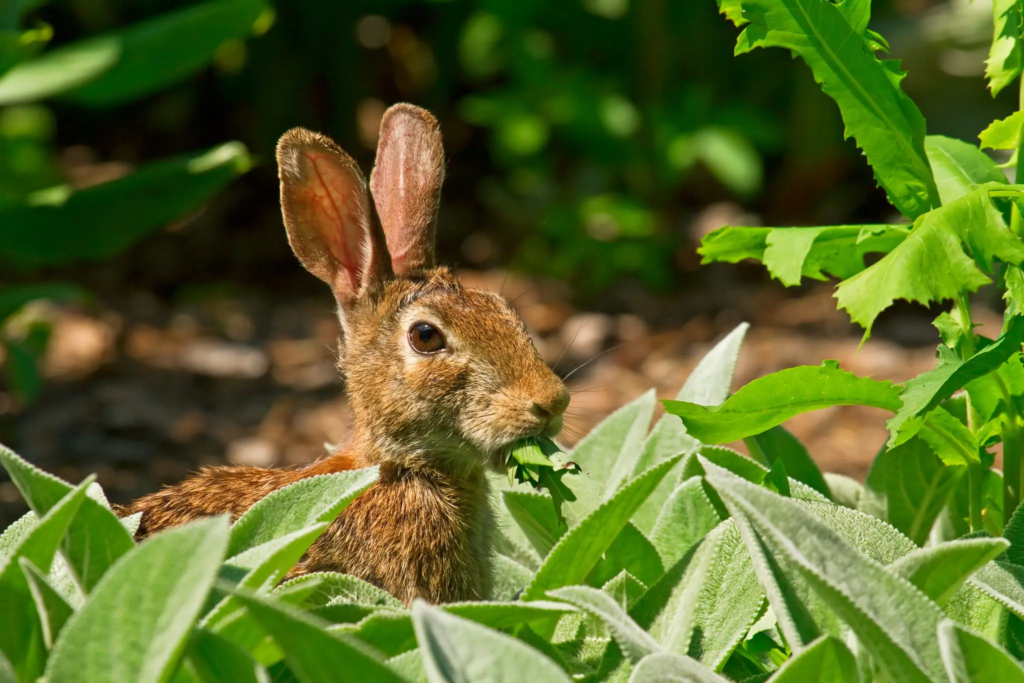When it comes to the dietary preferences of our furry companions, exploring various food options is both a responsibility and a curiosity. If you’ve ever wondered, Can rabbits eat rosemary? you’re about to find out. Rabbits are meticulous eaters with specific nutritional needs, and rosemary, with its distinct aroma and culinary uses, raises questions about its suitability for our lagomorph friends.
In this article, we will delve into the world of rabbit nutrition and the potential implications of introducing rosemary into their diets. By understanding the benefits and potential risks, you can make informed decisions to ensure the well-being of your beloved rabbits.
Can Rabbits Eat Rosemary?
Yes, rabbits can typically eat rosemary in small amounts occasionally. However, it’s important to be cautious, as rabbits have sensitive digestive systems. Introduce rosemary slowly, monitor your rabbit for any adverse reactions, and ensure it doesn’t replace their primary diet of hay and leafy greens. If in doubt, consult a veterinarian specializing in exotic pets.
How Much Quantity is Suitable to Eat Rosemary for Rabbits?

Certainly, the appropriate quantity of rosemary to include in a rabbit’s diet can indeed be influenced by its size. Understanding the nuances of portion control based on rabbit sizes is vital to ensuring their overall health and well-being. To provide more detailed insights, let’s explore a comprehensive guideline tailored to different categories of rabbit sizes:
Smaller Rabbit Breeds (e.g., Netherland Dwarf, Mini Rex):
Given the delicate nature of these diminutive rabbits, it’s prudent to offer a minimal amount of rosemary. A sprig measuring approximately 1 to 2 inches in length should suffice as an intermittent treat. Due to their more sensitive digestive systems, even a tiny quantity can make a notable impact. Opt for infrequent servings to prevent any potential discomfort.
Medium-Sized Rabbit Breeds (e.g., Holland Lop, Lionhead):
For rabbits falling into the medium size range, a slightly larger portion of rosemary can be considered. Around 2 to 3 inches of the herb can be offered occasionally. While they may be able to tolerate a bit more, moderation remains key. These rabbits exhibit varying sensitivities, so closely monitor their response and adjust the quantity accordingly.
Larger Rabbit Breeds (e.g., Flemish Giant, French Lop):
With larger rabbits, there’s a bit more leeway in the portion size of rosemary. Providing a sprig that measures up to 4 inches in length can be an option, still being cautious not to overdo it. These rabbits generally have more substantial digestive systems, but the emphasis on controlled and infrequent servings remains crucial.
How to Feed Rosemary to Rabbits?

Feeding rosemary to rabbits requires a cautious and gradual approach to ensure their well-being. Here’s a step-by-step process to safely introduce rosemary into your rabbit’s diet:
Step 1: Choose Fresh Rosemary:
Select fresh, organic rosemary that hasn’t been exposed to pesticides or chemicals. Wash the rosemary thoroughly under cool water to remove any dirt or residues.
Step 2: Begin with a Tiny Portion:
Start with an extremely small amount of rosemary, such as a single leaf or a piece about the size of your pinky fingernail. This initial portion is to gauge your rabbit’s reaction.
Step 3: Observe Closely:
Offer a small portion of rosemary to your rabbit and observe their behavior over the next 24 to 48 hours. Watch for any signs of digestive upset, such as changes in stool consistency, decreased appetite, or discomfort.
Step 4: Monitor for Allergic Reactions:
Keep an eye out for any signs of allergic reactions, which might include itching, excessive scratching, or swelling around the mouth or face. While rare, rabbits can develop allergies to certain foods.
Step 5: Gradually Increase Quantity:
If your rabbit shows no adverse reactions, you can gradually increase the quantity of rosemary. However, still keep the portions small and infrequent. As a treat, rosemary should remain a small part of your rabbit’s overall diet.
Step 6: Maintain a Balanced Diet:
Ensure that rosemary doesn’t replace the core components of your rabbit’s diet, which are hay and fresh leafy greens. These foods provide the essential nutrients and fiber that rabbits need for optimal health.
Step 7: Limit Frequency:
Offer rosemary only occasionally, perhaps once a week or even less frequently. This helps prevent any potential digestive disturbances and maintains variety in their diet.
Step 8: Consult a Veterinarian:
If you’re uncertain about introducing rosemary or any new food to your rabbit, consult a veterinarian with expertise in rabbit care. They can provide personalized advice based on your rabbit’s specific needs and health history.
Step 9: Rotate with Other Herbs:
Consider rotating rosemary with other rabbit-safe herbs like basil, mint, or cilantro. This provides variety and reduces the risk of overloading your rabbit with a single type of herb.
Step 10: Always Prioritize Safety:
Remember that your rabbit’s well-being is the top priority. If you ever notice any adverse reactions or concerns, discontinue offering rosemary and consult a veterinarian.
Health Benefits for Rabbits When Eating Rosemary:

Antioxidant Properties:
Rosemary contains compounds like rosmarinic acid and flavonoids that possess antioxidant properties. While research is limited in the context of rabbits, antioxidants are known to neutralize harmful free radicals in the body. In theory, this could support overall health and potentially contribute to disease prevention.
Anti-Inflammatory Effects:
Rosemary has been associated with anti-inflammatory effects in humans due to its constituents like rosmarinic acid and essential oils. If rabbits can indeed benefit similarly, incorporating rosemary into their diet might help mitigate inflammation, supporting their well-being.
Digestive Health:
Certain components of rosemary, including dietary fiber, may contribute to improved digestive health. Fiber aids in maintaining regular bowel movements and preventing gastrointestinal stasis, a condition where the digestive system slows down or stops functioning.
Stress Reduction:
The pleasant aroma of rosemary may have soothing effects. While not a substitute for proper rabbit care and a stress-free environment, exposure to pleasant scents could potentially contribute to a calmer and more relaxed state for rabbits.
Respiratory Health:
Rosemary’s aromatic compounds, when inhaled in small amounts, could potentially have positive effects on the respiratory system. However, it’s essential to ensure that rabbits are not exposed to excessive amounts of strong scents, as they have sensitive respiratory systems.
Potential Risks When Rabbits Eat Rosemary:
Digestive Sensitivity:
Rabbits have delicate digestive systems, and introducing new foods can lead to digestive upset. Rosemary contains essential oils and compounds that might not sit well with all rabbits, potentially causing diarrhea, gastrointestinal discomfort, or changes in appetite.
Allergic Reactions:
Just like humans, rabbits can also be sensitive or allergic to certain substances. Introducing rosemary could trigger allergic reactions, ranging from mild itching to more severe symptoms. Monitor your rabbit closely for any signs of discomfort or unusual behavior.
Chemical Contaminants:
If the rosemary has been treated with pesticides, herbicides, or other chemicals, it could be harmful to rabbits. Always ensure that any herbs or plants offered to rabbits are thoroughly washed and pesticide-free.
Gastrointestinal Stasis:
Rabbits are prone to gastrointestinal stasis, a serious condition where their digestive system slows down or stops. Introducing new foods, especially those that their digestive systems aren’t accustomed to, can potentially contribute to this condition.
Disruption of a Balanced Diet:
Offering rosemary as a treat should not replace a balanced diet of hay, fresh leafy greens, and water. Overemphasizing treats, including herbs like rosemary, can lead to imbalances in a rabbit’s nutrition and potential health issues.
Respiratory Sensitivity:
Strong scents, including the aromatic compounds found in rosemary, might be overwhelming for rabbits’ sensitive respiratory systems. Excessive exposure to strong scents could potentially lead to respiratory distress.

